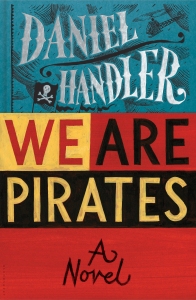Daniel Handler, We Are Pirates (Bloomsbury, 2015)
Until quite recently, Daniel Handler was best known as the creator of Lemony Snicket, the fictional narrator and named author of A Series of Unfortunate Events, a sequence for younger readers set in an offbeat American Gothic landscape where bookish heroes struggle against wicked and stupid tormentors. His works for adults treat much the same theme: imagination against its lack. The best introduction to adult Handler might still be the extraordinary short-story-collection-cum-novel Adverbs, but this latest novel sees his craft taken to violent extremes. The motif is piracy. Phil is a radio producer, who has recently fallen under the influence of a business philosophy urging him to embrace the great American outlaw tradition. Meanwhile, his bored and isolated teenage daughter Gwen is caught shoplifting. Her punishment is to help out at an old people’s home, where an old man with dementia asks her to r ead to him from his collection of pulp pirate novels. Like her father, Gwen is susceptible to the romance of the freebooter. She assembles a crew, steals a plastic pirate ship and sails off into San Francisco Bay, armed, in search of plunder. What follows is not Swallows and Amazons, it’s a gory satire on America’s dangerous love affair with the pirate.
Miranda July, The First Bad Man (Canongate, 2015)
 Cheryl, a single woman in her 40s, fills up her life with absurd but oddly relatable fantasies. She has a long-developed obsession with a senior colleague (with whom she believes she has shared multiple past lives) and seeks the object of her unused parental affection in the passing faces of other people’s babies (who clearly recognise her as the mother they should have had). Cheryl’s micromanaged madness is disturbed when the self-involved couple she works for ask her to take in their dysfunctional nineteen-year-old daughter Clee as a houseguest. The ensuing domestic conflict shatters Cheryl’s private world in unexpected ways. The novel inhabits the same landscape of pathological longings July explored in her excellent short story collection No One Belongs Here More Than You (2007). It certainly has much more in common with her past prose than it does with the two films she wrote, directed and acted in, Me and You and Everyone We Know (2005) and The Future (2011). While her films have been dismissed as whimsical, there is nothing remotely cute about The First Bad Man. July shows a painfully isolated sexuality meeting its counterpart; an incredibly odd, but credibly executed novel.
Cheryl, a single woman in her 40s, fills up her life with absurd but oddly relatable fantasies. She has a long-developed obsession with a senior colleague (with whom she believes she has shared multiple past lives) and seeks the object of her unused parental affection in the passing faces of other people’s babies (who clearly recognise her as the mother they should have had). Cheryl’s micromanaged madness is disturbed when the self-involved couple she works for ask her to take in their dysfunctional nineteen-year-old daughter Clee as a houseguest. The ensuing domestic conflict shatters Cheryl’s private world in unexpected ways. The novel inhabits the same landscape of pathological longings July explored in her excellent short story collection No One Belongs Here More Than You (2007). It certainly has much more in common with her past prose than it does with the two films she wrote, directed and acted in, Me and You and Everyone We Know (2005) and The Future (2011). While her films have been dismissed as whimsical, there is nothing remotely cute about The First Bad Man. July shows a painfully isolated sexuality meeting its counterpart; an incredibly odd, but credibly executed novel.
Joanna Newsom, Divers (LP) (Drag City, 2015)
Alongside Miranda July there runs at a distance another ingenious Californian auteur often mistaken for an eccentric: Joanna Newsom. The lyrics written for her latest album should certainly be considered the best reading emerging from that medium this year. Divers comes five years after her triple album Have One On Me and nine years after the extraordinary Ys (rhymes with ‘masterpiece’). In its eleven-track format, Divers is as straightforward a record as this artist is likely to make. In fact, one might have feared a breakthrough album. Thankfully, nothing was broken. Newsom remains irreducible, especially in her lyrics. Rarely outside of hip-hop is there as much attention to detail in setting a quantity of words to music. Setting hip-hop aside for a moment, not since the advent of Bob Dylan has there been such an opportunity for students of American letters to engage with the sung lyric. The words speak for themselves; these from the album’s defiant resolution, ‘Time, As A Symptom’:
A shore, a tide, unmoored—a sight, abroad:
A dawn, unmarked, undone, undarked (a god).
No time. No flock. No chime, no clock. No end.
White star, white ship—Nightjar, transmit: transcend!





Leave a Reply